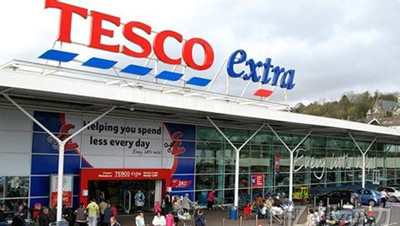Tesco's accounting problems
樂購財(cái)務(wù)危機(jī)
Not so funny
不那么有趣
Booking revenues, like comedy, is all about timing
預(yù)估收益和喜劇一樣,把握時(shí)機(jī)很重要
IT IS too soon to say whether the accounting misstatement at Tesco was cock-up or conspiracy. The source of the discrepancy is already clear, however, and it is as old as book-keeping itself: the premature recognition of revenue.
樂購財(cái)務(wù)造假是偶然還是蓄意目前還言之尚早。然而這種差異的來源已經(jīng)很清楚了,它發(fā)生在記賬階段:過早地確認(rèn)了收入。
Suppliers make payments to supermarkets that meet certain sales targets for their products, run promotions or place the goods in eye-catching places, such as at the end of aisles. Tesco managers appear to have been too ambitious in forecasting these “rebates”. They may also have underreported the costs of stolen and out-of-date produce.
若超市達(dá)到一定的產(chǎn)品銷售目標(biāo),舉辦促銷活動(dòng),或是將貨物擺放在醒目之處,比如超市過道的兩端,供應(yīng)商會(huì)支付給超市一定的費(fèi)用。樂購的管理層似乎過于高估了這些“回扣”的價(jià)值,當(dāng)然他們也可能是低估了被盜物品和過期物品的成本。
In a study of accounting scandals at American companies by the Committee of Sponsoring Organisations, a business-ethics body, the misrecording of revenues was to blame in 60% of cases. Manipulation generally falls into one of two categories. In the first, involving “timing differences”, the revenue is genuine but, say, sales at the start of a quarter are booked as having been struck in the previous one. The flipside of this is “cookie jar” accounting: pushing today's revenue into tomorrow so it can be dipped into to shore up weak quarters.
據(jù)企業(yè)倫理機(jī)構(gòu)發(fā)起人委員會(huì)的研究稱,美國公司60%的會(huì)計(jì)丑聞要?dú)w結(jié)于謊報(bào)收益。操縱行為一般可分為兩類。第一種情況涉及到“時(shí)差”,收益是真實(shí)的,但是季度初始的銷售額被列入上一個(gè)季度入賬。與之相對的是“餅干罐”記賬:將當(dāng)前收益推至將來,以此推高疲軟季度的銷售額。

In the second, more serious category, the sales are fake: often, a related party poses as a customer to generate phoney invoices. Examples include Gowex, a Spanish technology firm that folded earlier this year, and Satyam Computer of India, whose boss compared the escalation of the $1.5 billion fraud to riding a tiger that was ever harder to dismount without being eaten.
更嚴(yán)重的是第二類情況,即銷售額都是假的:通常情況下,業(yè)務(wù)關(guān)聯(lián)方會(huì)裝扮成顧客以產(chǎn)生虛假發(fā)票。西班牙科技公司Gowex今年早些時(shí)候便是因此破產(chǎn),而印度薩蒂揚(yáng)軟件公司老板身陷15億美元的詐騙升級案,時(shí)局愈發(fā)艱難,真真是騎虎難下,無法全身而退。
Working out how much revenue to book and when can be a matter of fine judgment. It is especially tricky in long-term contracts, such as in construction, or when the sale of goods is bundled with a service agreement, as with photocopiers. In a sign of how complex an area this is, only this year—after more than a decade of talks—did European and American standard-setters agree on a common approach to revenue recognition.
應(yīng)記多少收益以及何時(shí)記收益都需要準(zhǔn)確的判斷力。這在長期合同中尤為棘手,比如建筑合同,或是所售商品捆綁的服務(wù)合同。有一個(gè)跡象可以表明這個(gè)領(lǐng)域到底有多么復(fù)雜:經(jīng)過十多年的討論,直到今年,歐洲和美國的會(huì)計(jì)準(zhǔn)則制定者方才達(dá)成一個(gè)確認(rèn)收益的通用辦法。
The complexity of Tesco's promotional deals with suppliers may also have left much room for discretion, and honest mistakes, as well as deliberate distortions. But the risks around accounting for such payments are hardly new. The auditors of several big retailers have amplified their warnings in recent years as rebates have taken up more space on balance-sheets. In its most recent report, in May, Tesco's auditor, PwC, warned of the “risk of manipulation”.
樂購與供應(yīng)商間復(fù)雜的促銷協(xié)定可能也給酌情權(quán),無心之過,以及蓄意歪曲留下很大空間。但在財(cái)務(wù)上此類支付風(fēng)險(xiǎn)已不是什么新鮮事物。由于回扣在資產(chǎn)負(fù)債表中占據(jù)越來越大的比重,幾個(gè)大型零售商的審計(jì)機(jī)構(gòu)近年來已提升警告級別。樂購的審計(jì)機(jī)構(gòu)普華永道在5月份最新的報(bào)告中已警告其注意“操縱風(fēng)險(xiǎn)”。
If Tesco's books turn out to have been deliberately cooked, it would be the biggest fraud of its type in retailing since the scandal at US Foodservice in 2000-03. Several executives were fined or jailed for creating bogus rebates to boost profits and bonuses—complete with secret side agreements, in which suppliers agreed not to collect the exaggerated rebates. The Dutch parent company, Royal Ahold, settled with shareholders for $1.1 billion. Even if there was no fraudulent intent and the problems stem from a misunderstanding of the rules rather than knowing misapplication, the apparent scale of the error suggests that, at the very least, Tesco's internal controls need a thorough overhaul.
如果樂購被證實(shí)是蓄意加工賬表,這將是自2000-2003年美國餐飲業(yè)丑聞后零售業(yè)最大的欺詐騙局。數(shù)名高管已因編造虛假回扣以提高利潤和獎(jiǎng)金的行為被處以罰款或監(jiān)禁—他們與秘密方簽訂協(xié)議,其中供應(yīng)商同意不收取超額回扣。位于荷蘭的皇家阿霍德總公司為其股東的訴訟花費(fèi)了11億美元。即使公司沒有欺詐意圖,或是由于誤解準(zhǔn)則產(chǎn)生問題,并非明知不可為而為之,這份過失的顯著規(guī)模最起碼表明樂購的內(nèi)部控制需要徹底整改了。












